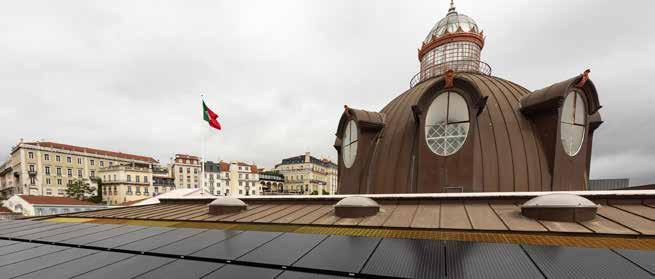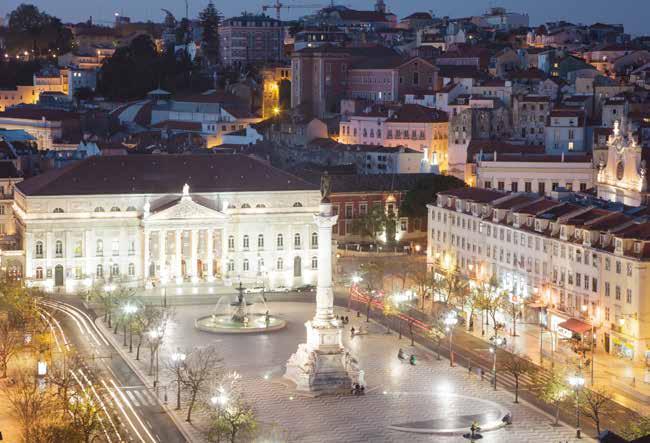
3 minute read
Climate Change Mitigation
Each city has its own climate challenges. Lisbon’s main issues stem from its southern position and location at the estuary of the River Tagus
Reducing CO2 emissions is a priority for Lisbon. The city is now focused on reaching a 60% reduction by 2030, under the commitments defined in the framework of the New Covenant of Mayors for Climate and Energy; with the ultimate target of being carbon neutral by 2050 (base year 2002).
Advertisement
Lisbon’s carbon neutral targets align with the EU Energy System Integration Strategy2. Its aim is to design a more efficient and integrated system that links energy sources and infrastructure, to support decarbonisation, and build a climate neutral EU by 2050.
Lisbon is delivering an integrated set of measures in the areas of Energy, Mobility, Water, Waste, Biodiversity and Sustainable Land Use, to mitigate against climate change and improve people’s quality of life.
A considerable energy efficiency programme for the city’s buildings is underway. There is a target to reduce energy in municipal buildings by 30% by 2030 (base year 2016); and by 20% in private buildings (base year 2016).
2 https://ec.europa.eu/commission/presscorner/detail/en/fs_20_1295

City Hall has been retrofitted for energy efficiency including the addition of solar panels. In the year after the retrofit, it used 50% less energy
Pioneering the ESCO model in Portugal, back in 2015, the municipality shifted to a 100% LED technology traffic light system in a few months. This is currently reaping savings of 90%. The LED traffic lights save the city over 1,521 tonnes of CO2 emissions annually and €800,000 per year. At a time of financial difficulties for city management, this allowed for large future savings with no initial investment from the city, proving a model that can be extremely useful to leverage any city’s investments in a climate action plan.
Within the public affordable housing programmes, the municipality is setting ambitious performance standards for the new developments, leading to A or A+ energy performance labelling.
An ambitious “Solar City” project is doubling solar energy installed in buildings between 2018 and 2021, attaining a cumulative solar capacity of 8 MW, in municipal facilities alone. By 2030, a cumulative capacity of 103 MW will be installed throughout the city, with potential to tap around 5% of the total electricity demand.
The Energy and Environment Agency of Lisboa, “Lisboa-e-Nova”, is a non-profit association that acts as a shared platform for innovation and climate action between the municipality and the main private and public stakeholders. City Hall, an iconic and historical building, is collaborating with the Agency to become an example of energy efficiency and is now a leading example for historical buildings to adapt to energy efficiency. Comprising 2,200 LED lights, 99 new insulated windows, 60 solar panels and a hightech monitoring integrated system, the building is saving 50% in energy consumption (€83,000 per year) while keeping the protected heritage characteristics of the building.
Lisbon Metropolitan Area is acting as a new sustainable mobility leverage and as a strong influencer to integrated climate responses. Lisbon Metropolitan Area is designing a unique Climate Adaptation Strategy and some integrated projects for metropolitan green corridors and cycle-paths are being designed and implemented in partnership.
The Lisbon Commitment
One of the biggest remaining challenges for Lisbon is improving the energy performance of the building and transportation sectors, which together represent more than 90% of the primary energy consumption within the city. The Lisbon Commitment, launched within the European Green Capital 2020 initiatives, engages companies that commit to self-established 2030 sustainable energy goals.
The Lisbon Commitment - Climate Action 2030 charter, allows signatories to set their individual goals to contribute to Lisbon’s sustainability targets. There are six different themes under which targets can be set: (1) mobility, (2) energy, (3) water, (4) waste and circular economy, (5) air quality and noise, and (6) awareness and public engagement. To date, more than 200 organisations have not just signed the charter, but have committed to delivering hundreds of actions aswell.
Lisbon is using LED technology to light up the city while reducing energy consumption and costs. All traffic lights within the city are LED-based











